Supporting Small Business During COVID
New business models and out-of-the-box thinking keep the doors open.
When the COVID-19 crisis first erupted in Georgia last March, the threat of the pandemic growing from a few weeks to months, small business owners questioned how they could remain open and still pay their bills. Would their stores or shops ever again become safe places for customers?
In the early days of the pandemic, the $349 million federal Paycheck Protection Program provided small businesses financial assistance to pay their employees, but that was not merely enough, according to seven Jewish owners interviewed for this story. Almost overnight, store owners and employees had to find ways to stay afloat with innovative ideas. It took grit, imagination and research to come up with new business plans, those interviewed said.
“In those initial weeks of COVID, it was all about survival,” said Sugandha Rosenhaft of La Dee Da children’s art studio. “Moving very quickly, I made up Grab n’ Go Art Kits for parents to pick up,” she said in an email to the AJT.
Now, almost a year later, with many changes in place, customers are back supporting small businesses such as La Dee Da and other Jewish-owned companies, while owners continue to follow CDC guidelines and find themselves increasingly dependent on the computer and virtual platforms such as Zoom.
Doggie daycare to baby boutique
At the start of the pandemic, Atlanta native Ashley Jacobsohn and her husband had owned a thriving dog daycare business in Roswell for 10 years. She received PPP assistance, so about a dozen people on staff were able to keep their pay and benefits in place.

When people started working from home and not traveling, they didn’t need to board their dogs. “We went from boarding 50 or more dogs a day to exactly 0 overnight,” she emailed the AJT. At the same time her lease was coming to an end. “I felt fortunate to find a buyer. I closed on the sale of that business on a Zoom call from the hospital bed at Northside [Hospital] about four hours after having an emergency C-section to deliver our son.”
After extensive research about her next business move, Wee Bee Baby Boutique opened its doors in Chamblee in November.
Although the new business had space for classes, lactation consulting and birthday parties, those in-person programs couldn’t occur because of COVID. Before Chanukah, the boutique hosted a socially distanced “Build Your Own Menorah” party despite the health limitations.
Jacobsohn mentioned the support received from metro Atlanta’s Jewish community during the pandemic. “Our landlord Eddie Dressler of Dressler’s Jewish Funeral Care is incredible and has been so supportive” she said. Describing her “Jewish grandmother network,” Jacobsohn said, “Atlanta’s Jewish grandmothers, who are friends with each other, whom I know well, take great care of us, spreading through word-of-mouth news about our new business.”
Like other business owners interviewed for this article, Jacobsohn looks forward to when she can meet more of her customers in person. For now, she remains cautious, following CDC guidelines to protect her family, “our customers and our parents whom we love and want to keep healthy.”
Passing on surplus
After Purim last year, just as COVID gained control, Passover deliveries arrived from multiple vendors to Spicy Peach. “We had ordered as though people would be hosting large seders and having children and grandchildren all needing Passover food,” said co-owner Jodi Wittenberg.
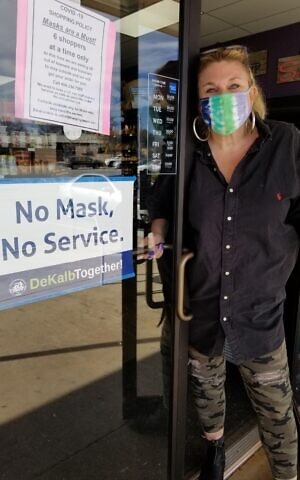
Not able to sell the Passover merchandise, the Toco Hills kosher grocery donated to families in need and also delivered carloads to the Jewish Family & Career Services’ Kosher Food Pantry and Yad L’Yad, a Toco Hills nonprofit providing kosher food biweekly to local Jewish individuals and families.
During those early days of COVID, customers learned about the store’s inventory through Facebook Live events and an Excel spreadsheet, and the store only offered curbside shopping.
Wittenberg outlined how Spicy Peach adheres to CDC guidelines during the ongoing pandemic. Fresh food handlers wear masks while constantly washing their hands. Employees must present a negative COVID test before coming back to work after traveling. Sanitizing wipes and hand sanitizer sit by the register and front doors. Masks must be worn inside, and if needed, the store supplies them.
“We prefer no out-of-towners in the store, especially if from COVID-heavy communities, but we can’t really control that,” Wittenberg said.
COVID health and safety requirements are prominently displayed on the front windows and entry door with a maximum of six customers allowed to shop in the store at a time. Curbside pickup is still available for those who need or desire it.
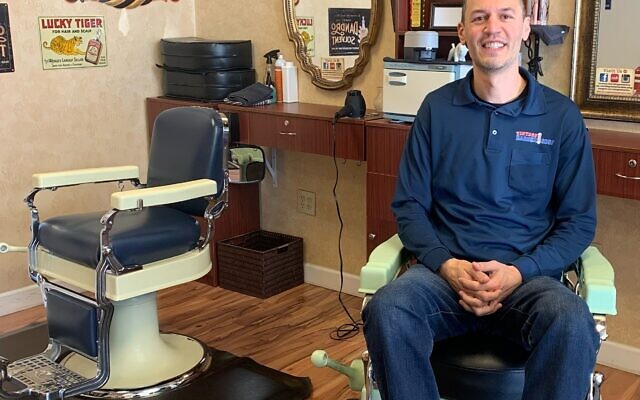
Government lifeline
When shelter-in-place restrictions began in March, Yury Abramov, owner of Vintage Barbershop in Sandy Springs, had to close for almost a month. He later received PPP funding, which “helped in keeping staff on board, and with rent assistance,” Abramov said.
Upon reopening, after the government lifted the stay-at-home order, Abramov mandated masks to his employees and sanitized workstations with distance between them. Appointments were also staggered.
He now offers private appointments and house calls.
Virtual learning
When COVID arrived last year, La Dee Da’s full schedule of classes, school break and summer camps, along with its ability to hold children’s birthday parties came to a halt.

Because the business only had one full time employee and two teachers as contractors year-round, she only qualified for a very small PPP grant. Rosenhaft recalls taking a late-night trip to Wal-Mart wearing multiple layers of masks and gloves just to replenish her art supplies to make up her Grab n’ Go kits.
Throughout the summer, La Dee Da became operational with in-person camps, and later with after-school art classes, while being extremely cautious and reducing maximum participation capacity.
With children socially isolated in their homes, and parents struggling with childcare and virtual school demands, La Dee Da turned its space into virtual pods for teaching elementary-aged students.
In addition to requiring all staff and children to wear masks, parents are no longer allowed to walk in to drop off their children, only curbside drop-off is allowed, Rosenhaft said. In addition to taking temperatures, sanitizing, frequent handwashing and more deep cleaning, an outdoor wash sink was installed so “we could all practice extra hand-washing after eating and playing.” The outdoor play area was revamped and the indoor play area, with its ball pit, toddler toys and tree house, was closed.
“We have been lucky not to have any campers or staff members impacted by COVID-19 while attending our program thus far.”
Meals on the run
Steve Gilmer, owner of Kosher Gourmet, told the AJT that “COVID caused us to lose all our catering.”
These days, Gilmer offers an online menu through MenuPix and provides more home deliveries in and outside his Toco Hills neighborhood. His takeout service also has grown.
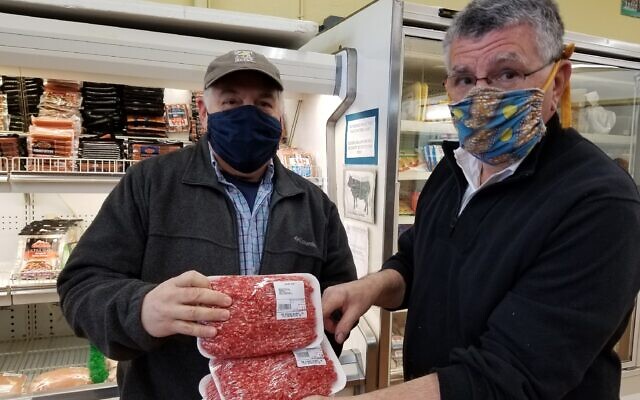
When customers were not holding big seders or only one or two were celebrating at home, customers purchased Seder in a Box filled with a traditional Passover meal. The same concept applies to the current Shabbat in a Box offering.
Gilmer credits the Orthodox synagogue community, even more so during COVID, for their support. “Kosher meat cooked meals have increased.”
Print on demand
Last April, Hal Rabinowitz of Toco Instant Printing applied and received government PPP funds “because nobody knew where this was headed as business sharply declined,” he said.
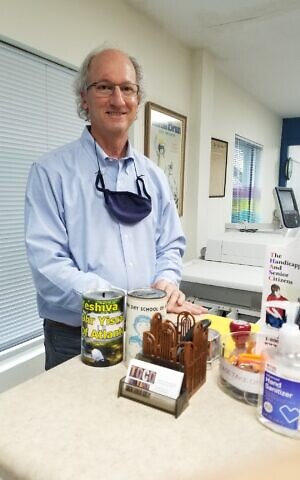
Designated as an “essential service” by local governments, he was able to stay open. Following CDC guidelines, Rabinowitz placed the now commonplace floor stickers that indicated how customers can maintain a 6-foot distance. He arranged sanitizer pumps on the counters, installed a large plexiglass divider at the main counter and put a “masks must be worn” sign on the front door. Rabinowitz and his assistant also wear masks at all times.
Rabinowitz services a number of rabbis, teachers, and adults who work in several Jewish schools, synagogues and organizations in the area. When COVID raised its head last spring, those institutions closed. Fewer printed programs and agendas were needed for their religious events and programs. Even when the Jewish institutions reopened, smaller groups attended, so large quantities of printed materials weren’t needed.
However, during the pandemic, as more retirees and other adults were staying at home, Rabinowitz observed more people coming into the shop with their family photos, immigration documents and genealogy records. They ordered copies and scans to be saved electronically, which could be shared with their family and friends via email or social media.
Can’t stop the beat
When COVID hit in the spring, in-person lessons at Sandy Spring Music quickly switched to virtual ones. Groups of Rock Band classes were paused. The recording studio was sidelined.
The pandemic time forced owner David Szikman and his staff to learn how to use high-definition webcams and small microphones with Zoom to improve the music lesson experience.
Then Szikman helped train his students and families to use the new virtual platform. “The whole world began using this way to teach, so we were all on the journey together,” he said.
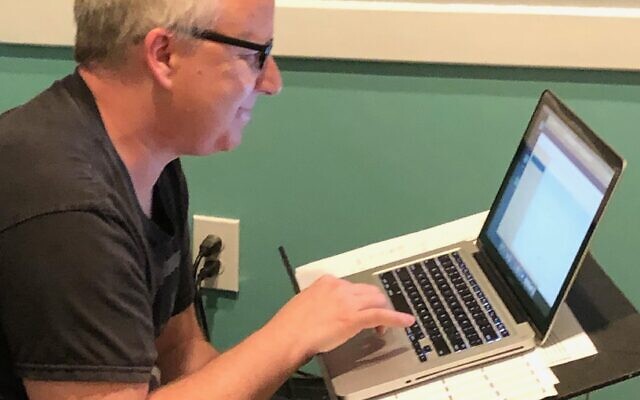
Because there is a split-second delay when conducting music lessons virtually, teachers send their students recorded videos in advance. That way, when lessons begin, students can pull up the previously recorded tracks and sing or play along with the videos, “since we can’t play ‘live’ together over a Zoom call,” he said.
As teachers mainly instruct from their homes, it’s only the office managers and store sales people who remain in his store, where CDC guidelines are followed and staff is always masked.
“The support from our families, customers and our staff and their ability to change the entire way they’ve taught for years is nothing short of amazing and I am eternally grateful.”
Like most of the small business owners interviewed for this story, a recurring theme was appreciation for the Jewish community’s commitment to shopping local – even during a pandemic.
- Flora Rosefsky
- COVID
- pandemic
- CDC guidelines
- PPP
- Paycheck Protection Program
- GoFundMe
- yury abramov
- Steve Gilmer
- Ashley Jacobsohn
- Jewish Family & Career Services
- Yad L'Yad
- Hal Rabinowitz
- Sugandha Rosenhaft
- Dave Szikman
- Jodi Wittenberg
- Chamblee
- Sandy Springs
- Toco Hill Shopping Center
- Kosher Gourmet
- La Dee Da
- Mensch Wireless
- Sandy Springs Music
- Spicy Peach
- Toco Instant Printing
- vintage barbershop
- WeeBee Baby Boutique




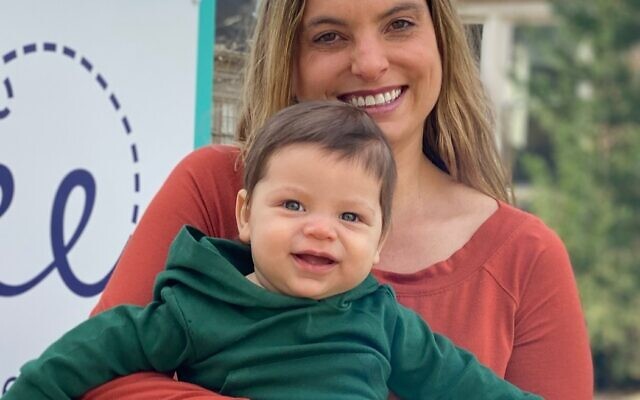

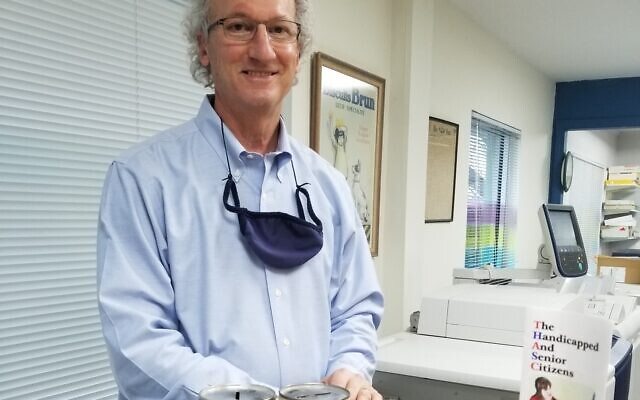
comments